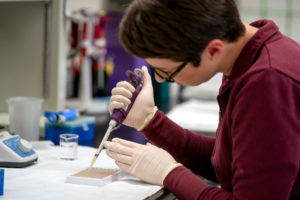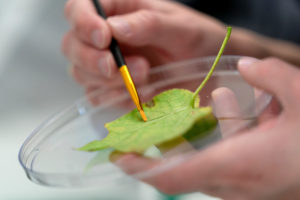First gift to propel Institute for Advancing Health Through Agriculture
G.R. White Trust pledge to create professorship of precision nutrition
George Rollie White, Texas A&M University class of 1895, continues to impact individual lives and innovative programs well beyond his lifetime.

G.R. White Trust, a trust established by White, has pledged $500,000 to the newly established Texas A&M AgriLife Institute for Advancing Health Through Agriculture, IHA. Inspired by White’s passion for Texas A&M and the potential for impact on public health, the gift will create a professorship of precision nutrition at the institute.
G.R. White Trust selection committee member Joe Lenamon ’51, who joined the three-person selection committee directed to carry out White’s will, said White was a staunch supporter and advocate for the university during his life, and the professorship adds to that legacy.
“Mr. White was a forward-thinking man, and, as a committee, we look for opportunities to support items we think Rollie would be proud to support,” Lenamon said. “He loved being an Aggie, and he had the forethought to set up the trust because he wanted to continue making a positive impact.”
Planting a legacy in agriculture and health
Throughout his life, White worked as a former rancher and banker. He served on the Board of Regents from 1926-1955 and as chairman from 1945-1955. He passed away in 1965 and left behind one of the most influential legacies for agriculture and health.
As established by his will, the G.R. White Trust decided to leave a portion of his holdings as an endowment that would benefit the city of Brady and McCulloch County, Texas A&M University and other institutions across the state and country that positively impact agriculture, education and health.
Furthermore, Lenamon said the trust has supported a wide range of benefactors over the decades, from local fire departments and hospitals to first-generation college students. Under provisions of White’s will, 17.65% of the trust’s income goes to scholarships, and a selection committee administers the remainder.
Bart Wulff, a trust selection committee member, said over the years the trust has supported agricultural science initiatives and institutional projects focused on scientific concepts that will benefit society. Speaking to this effort, Wulff said establishing the endowed professorship provides a way for the institute to recruit or maintain faculty who will accelerate the precision nutrition research initiatives.
“The idea in those cases has been to provide seed money to get these new concepts started and moving in the right direction,” he said. “This professorship is essentially our way of boosting the institute’s mission. We trust the administration will put the right person in place, and hopefully, the research makes a lasting impact.”
Professorship looks to make lasting impact on public health

IHA director Patrick J. Stover, Ph.D., said funding the professorship of precision nutrition is a critical step in the institute’s future and ultimate mission.
The IHA is the first research center to focus on how precision nutrition strategies and responsive agriculture research can improve public health and lower health care costs in environmentally and economically sustainable ways. The goal is to reconnect consumers with agriculture to encourage healthier choices and better quality of life while providing economic opportunity for producers.
The IHA has three focus areas: precision nutrition, responsive agriculture and healthy living. These areas will bring together experts across many disciplines, including agriculture, nutrition, behavioral, social and life sciences, engineering, data and computation science, and economics, to meet the overall mission of advancing health through agriculture.
To meet this mission, IHA will collaborate with Texas A&M University, Prairie View A&M University, the Texas A&M AgriLife Extension Service, and the U.S. Department of Agriculture’s Agriculture Research Service, ARS. IHA will also act as a coordinating center for ARS and land-grant institutions to collaborate on programs, exchange ideas and data, and use state-of-the-art technology such as artificial intelligence and computational systems to propel the research and meet key objectives.
“The way G.R. White created the trust as a mechanism to make an impact beyond his life is a testament to who he was, and the way the trust has acted on his wishes over the decades is testament to their hope to improve individual lives, communities and society overall,” Stover said. “We are honored to be a recipient of their financial support, and we are proud that the IHA mission was identified as an embodiment of G.R. White’s vision of improving lives through science and agriculture.”
To learn how to support the work at the IHA, contact Allyson Tjoelker ’02 at [email protected].


